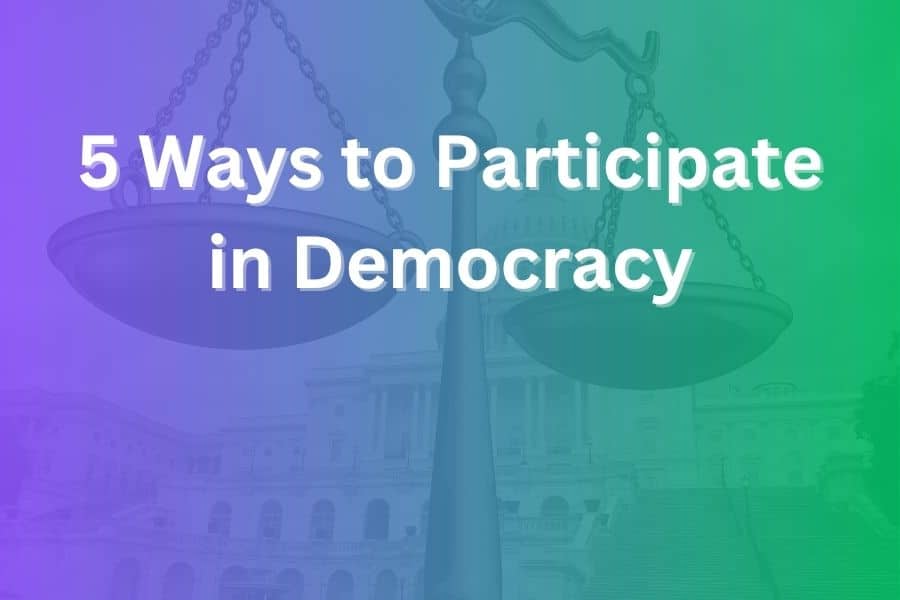 Democracy thrives when you don’t just watch from the sidelines — you step in. Whether you live in a big city or a quiet town in the U.S., your active engagement strengthens the system that represents you.
Democracy thrives when you don’t just watch from the sidelines — you step in. Whether you live in a big city or a quiet town in the U.S., your active engagement strengthens the system that represents you.
In this article we’ll explore five powerful ways you can participate in democracy in the U.S., how each method works, and how to make a real difference in your community and beyond.
Vote and Stay Informed
You already know that casting a ballot matters — recent data shows U.S. voter turnout hovered around 66% in the 2020 presidential election. But participating in democracy doesn’t end when the polls close.
Before you vote, stay informed. Monitor news about candidates and issues, check municipal ballots for local measures, and register if you haven’t already. If you’re 18 or older, make sure your registration is current and correct. When you vote, you play a direct role in selecting the people and policies that shape your life: from federal offices to state and local positions.
Don’t stop at the election day. Understand what your laws, your school board decisions, and your local taxes mean. That helps you vote with awareness, not just routine. When you cast your vote informed, you hold leaders accountable and elevate the quality of democracy.
Engage with Your Representatives and Community
Once you’ve voted, the next step is to connect with the people you elected and the community you live in. Contacting your representatives — local city council members, state legislators, U.S. senators and members of the House — gives you direct influence. You can write letters, send emails, call offices, even attend town-hall meetings.
Democracy isn’t just about voices at the ballot box; it’s about conversations in real time. When you speak up about an issue you care about — say, public safety, education funding, or environmental protections — you make your concerns known. You also help shape policy before it becomes law.
Engaging locally helps too. Attend school board meetings, community planning sessions, or neighborhood forums. Your presence alone signals that you matter, your opinions matter, and decision-makers should listen. Democracy works best when you don’t outsource your voice. You should use it.
Volunteer, Organize, and Support Civic Activities
Participation in democracy extends beyond voting and meetings. You can volunteer for civic organizations, join local advocacy groups, support campaigns, set up community clean-ups, or mentor young people. These actions build the civic infrastructure that keeps democracy alive.
For example, you might join or support nonprofits that encourage voter registration, or groups that train citizens in public speaking and civic leadership. You might also volunteer in neighborhood outreach or campaign for candidates you believe in. These efforts create ripple effects: they increase political awareness, build local networks, and empower communities.
When you engage this way, you become more than a passive participant — you become a catalyst. You help ensure that democratic participation does not rest solely on election days but enriches daily life.
Attend Public Meetings and Participate in Policy Discussions
Many democratic opportunities happen quietly but powerfully at the local level. You can attend public hearings for zoning changes, budgeting meetings for city and county governments, or school board discussions. By showing up you gather insights, ask questions, and see how decisions are made.
Being present at meetings also allows you to voice opinions and support or oppose proposals before they’re finalized. When you step into that space, you help democracy operate in daylight rather than behind closed doors. You reduce the gap between policy-makers and people.
Also consider using digital tools. Many local governments livestream or post recordings of meetings. You can comment, ask questions, or submit feedback even from home. With issues like transportation, infrastructure, or environmental policy, these forums allow your voice to shape outcomes.
Educate Others, Promote Dialogue and Defend Democratic Values
Beyond direct action, you play a vital role by educating others and fostering civic dialogue. You might host a discussion at your community center, write thoughtful posts on social media, or lead a study group on civic rights and responsibilities. By promoting thoughtful conversation, you help build an informed society.
In recent years, misinformation and polarization have challenged democratic norms. You can combat that by being fact-driven, respectful, and open-minded. Encourage people around you to vote, to engage, to listen. Democracy depends not only on structures but on culture — the way people treat one another in civic spaces.
Another key role: defending democratic values. That means standing up for free and fair elections, supporting equal representation, ensuring all voices are heard, and pushing for transparency and accountability. Even if it seems like someone else will handle it, your steady vigilance matters.
Bringing It All Together
When you participate in democracy using these five ways, you don’t just check a box — you build the foundation of an engaged society. Here’s a quick snapshot of how these pieces link together:
- Vote and stay informed: You decide the direction.
- Engage with elected officials and your community: You influence the process.
- Volunteer and organize civic activities: You sustain the system.
- Attend meetings and engage in policy discussions: You shape the details.
- Educate others and uphold democratic values: You protect the culture.
Millions of Americans already practise one or more of these, but your consistent effort raises the overall standard. For example, when you commit to attending one local meeting monthly, or mentor a young voter, you tip the balance toward stronger civic ecosystems.
What You Can Do This Week
Pick one action this week:
• Register or update your registration if needed.
• Look up when the next local government meeting is and plan attendence.
• Write a letter or email to your representative about a community issue.
• Volunteer or donate time to a civic group near you.
• Host a short chat with friends or family about why civic engagement matters.
Starting small keeps momentum. Over time you’ll find your voice, your networks, your impact deepen. That’s the heart of democracy in action.
Why Your Participation Matters
In the U.S., the notion of “government of the people, by the people, for the people” only survives when citizens play active roles. If too many opt out, the system drifts toward complacency, influence by a few, and weaker accountability. But when you step up consistently, you help ensure equity, responsiveness, and fairness in governance.
And remember: Your influence is strongest locally. While national politics dominate headlines, your direct impact often comes in school boards, city councils, community groups, and local planning sessions. That’s where democracy is lived.
When you commit to participating in democracy in all these ways, you become part of a legacy — one where citizens don’t just depend on democracy; they propel it. Democracy becomes not just a system but a shared responsibility and a shared achievement.
By using your voice, your time, and your conviction you help ensure that democracy remains vibrant, inclusive, and ready for the future.








